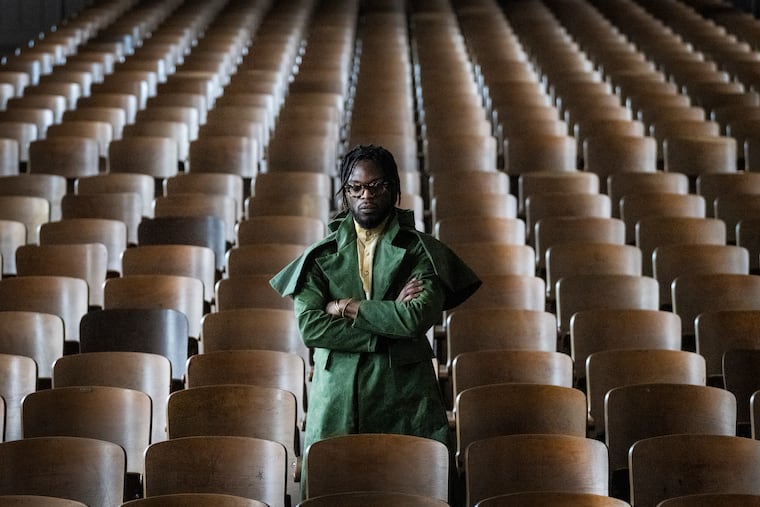Philly filmmaker Walé Oyéjidé captures the beauty of Blackness in his debut feature
"Bravo, Burkina!" premieres at Sundance Jan. 24 and is available to stream online

No matter the medium, filmmaker Walé Oyéjidé captures the beauty of Blackness in his artistic pursuits, and embraces his Nigerian heritage and wears it for the world to see.
Oyéjidé weaves the threads of his lineage with style as a clothing designer. And as a musician and photographer, he expresses it in song and image. Now, he shines a light on the Black experience and its lyrical allure with his debut feature, Bravo, Burkina!, set to premiere, in-person and online, at the Sundance Film Festival on Tuesday.
Written and directed by Oyéjidé, the film is a story of a Burkinabè boy who flees his village to start anew in a small Italian city, later traveling back in time to regain what he lost from his voyage. Beyond a tale of migration, the project explores love, loss, and discovery, themes Oyéjidé said resonate with people from all walks of life.
“It’s an immigrant story. It’s an outsider story. It’s a love story. It’s got time travel. It’s got a bunch of darts thrown at the board, and I think there’s a lot for people to connect with,” Oyéjidé, a Landsdowne resident, said. “It’s also unabashedly a beautiful African story. As much as you love Martin Scorsese’s fantastic Italian films, there’s room for this, too.”
A part of his own story brought to the big screen
Like the film’s main character, Aimé, Oyéjidé was born in West Africa and became an immigrant of the world, growing up largely in Nigeria and the Middle East. As a teen, he and his family moved to Atlanta before settling in Philly, where Oyéjidé graduated from Temple University’s Beasley School of Law in 2010.
It’s a story that’s present in all of his work.
“My upbringing as an immigrant to America has informed all of my artwork and the way I see the world,” Oyéjidé said. “I’m always appreciative of the privilege and benefit of moving to this great country. But I’m also aware of the sacrifices many make so they can come here and the many loved ones they leave behind.”
» READ MORE: A curated Sundance watch list from a Philly-born programmer for his hometown audiences
From Philly lawyer to film director
While practicing as a defense litigator, Oyéjidé began exploring his love of menswear, eventually starting his own West African-inspired fashion brand, Ikiré Jones, with long-time collaborator Sam Hubler in 2012. Their eye for couture led to their first foray into the movie industry when Marvel Entertainment tapped the duo to make costumes for 2018′s Black Panther.
“Black Panther was, before this, probably the biggest thing that people would be aware of our work for, and we’re grateful for all the attention and all the opportunities we got,” he said. “It gave me proximity and a chance to do more things.”
That included filmmaking.
“For those of us from immigrant backgrounds, there tends to be a strong emphasis on walking familiar and well-trodden paths — like being a physician or lawyer. Becoming a director wasn’t something I imagined in my youth. But in retrospect, my previous careers as an attorney, a musician, and a designer have all dovetailed here,” he said. “The films have become my arguments. The audience has become my jury.”
Filmmaking as an inevitable path
For the 12-day shoot, Oyéjidé and a small crew flew to Ouagadougou, Burkina Faso, and Bologna, Italy, operating a run-and-gun production with limited resources and an airtight schedule.
“He’s brilliant,” said Hubler, who helmed the audio of the film. “He went in with a pretty set script this time, but he’s also very good at kind of working with what is presented to him — the situation on what’s available on the day and working the story around certain circumstances.”
While the film is a “global effort,” the filmmaker insisted that the production wouldn’t have happened without “the help of Philadelphia’s film community” that supported the film through its production journey.
Giulia Alagna, who worked as a producer on Bravo, Burkina!, said the way Oyéjidé is able to take on other creative mediums is a lost art and reminiscent of iconic artists of the past.
“I always tell him, ‘You’re a real Renaissance man and you’re not even from Italy,’” she said. “Whether it’s poetry, photography, or directing a film, nothing seems unsurmountable to him ... and he conquers them all.”
Oyéjidé believes that it’s important for Black storytellers to showcase the vastness of the Black experience — within U.S. borders and beyond.
“I think the challenge now becomes, if you are choosing to make art that comes from this cultural perspective, we all need to challenge ourselves to just fly higher, be braver, and go to places that we haven’t seen,” he said.
“Bravo, Burkina!” will premiere at the Sundance Film Festival on Jan. 24 and can be streamed online. For information on upcoming screenings, visit bravoburkina.com.